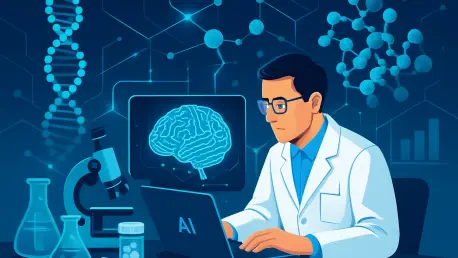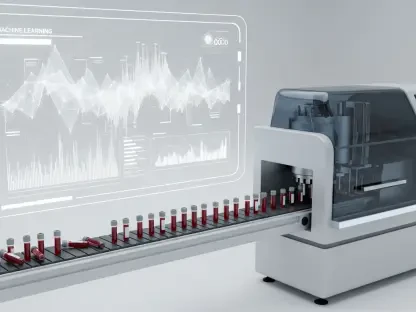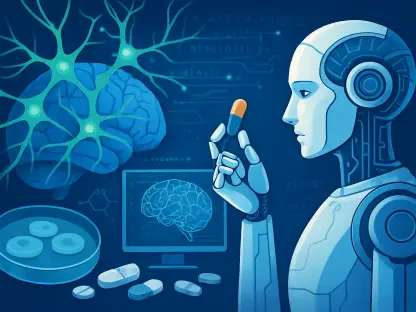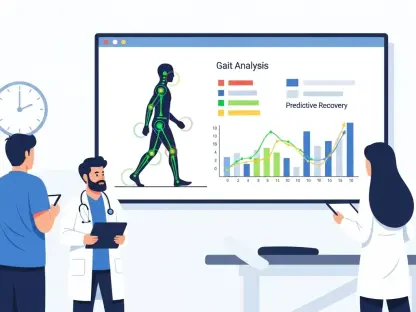The biopharmaceutical industry stands at a critical juncture where the integration of artificial intelligence (AI) into contract development and manufacturing organizations (CDMOs) is no longer a distant vision but a pressing reality. With the global biopharma market facing mounting pressure to accelerate drug development while slashing costs, AI emerges as a beacon of innovation, promising to streamline processes that once took years into mere months. Consider the staggering potential: AI-driven analytics can predict drug candidate success rates with unprecedented accuracy, potentially saving billions in R&D expenses. This review delves into how AI is reshaping the CDMO landscape, examining its core features, real-world performance, and the hurdles that must be overcome to fully harness its capabilities.
Core Features Driving Change
Data Analytics as a Game-Changer
At the heart of AI’s impact on CDMOs lies its prowess in data analytics, a feature that transforms vast, unwieldy datasets into actionable insights. Machine learning algorithms sift through terabytes of clinical trial data, identifying patterns that human analysts might overlook, thus enhancing decision-making in drug discovery and supply chain logistics. The significance of this cannot be overstated—faster, data-driven decisions reduce time-to-market for critical therapies, a metric that defines success in this competitive sector.
Beyond raw speed, AI analytics also refines precision in operational workflows. For instance, predictive models can forecast demand fluctuations, enabling CDMOs to optimize inventory and minimize waste. This capability not only cuts costs but also ensures that resources are allocated efficiently, a crucial advantage in an industry where margins are often tight.
Automation Redefining Manufacturing
Another standout feature of AI in CDMOs is automation, particularly in manufacturing processes. Robotic process automation, guided by AI, handles repetitive tasks such as batch processing with minimal human intervention, slashing error rates and boosting throughput. This technology integrates seamlessly with predictive maintenance systems, which anticipate equipment failures before they occur, thereby reducing downtime.
The technical sophistication of AI-driven automation extends to quality control, where real-time monitoring ensures compliance with stringent regulatory standards. By embedding sensors and AI algorithms into production lines, CDMOs can detect deviations instantly, maintaining consistency across batches. This level of precision is vital for upholding trust with clients and regulators alike.
Performance in Real-World Scenarios
Optimizing Supply Chain and Logistics
AI’s performance in the CDMO sector shines through in practical applications, notably in supply chain management. At companies like Bora Pharmaceuticals, AI systems analyze historical data alongside real-time market trends to streamline logistics, ensuring timely delivery of raw materials and finished products. This has led to measurable reductions in lead times, a critical factor in meeting client deadlines.
Such implementations highlight AI’s ability to adapt to complex, dynamic environments. By forecasting potential disruptions—whether due to geopolitical tensions or natural disasters—these systems enable proactive adjustments, safeguarding operational continuity. This resilience is a key performance indicator for CDMOs navigating global uncertainties.
Streamlining Regulatory and Drug Discovery Processes
In the realm of regulatory compliance, AI has proven transformative, as evidenced by efforts at Lonza Capsugel to digitize documentation. Online platforms powered by AI provide a centralized hub for quality assurance records, accessible to clients and regulatory bodies, eliminating outdated manual processes. This not only accelerates audits but also enhances transparency, a cornerstone of industry credibility.
Moreover, AI’s role in drug discovery offers striking results, with algorithms identifying novel molecular structures for complex therapies. In personalized medicine manufacturing, AI tailors production to individual patient profiles, pushing the boundaries of what CDMOs can achieve. These advancements underscore AI’s capacity to drive innovation at every stage of the biopharma pipeline.
Challenges Tempering Enthusiasm
Data Quality and System Integration Issues
Despite its promise, AI’s performance in CDMOs is not without significant challenges, particularly around data quality. Many organizations grapple with disparate systems and inconsistent data formats, which undermine the effectiveness of AI tools. Poor data hygiene, as industry leaders from KBI Biopharma have noted, can render even the most advanced algorithms ineffective, delaying expected returns on investment.
System integration poses another hurdle, as legacy infrastructure often clashes with modern AI platforms. Bridging these gaps requires substantial investment in digital transformation, a process that can strain resources. Until these foundational issues are addressed, the full potential of AI remains out of reach for many CDMOs.
Workforce Readiness and Regulatory Barriers
The human element also presents a barrier to AI adoption, with a notable skills gap among the workforce. Experts from Arcinova have highlighted the scarcity of personnel equipped to leverage digital tools, necessitating comprehensive upskilling programs. Without internal champions who understand both biopharma processes and AI technologies, implementation falters.
Regulatory challenges further complicate the landscape, as increasing molecular complexity in AI-driven drug discovery raises quality assurance concerns. Ensuring compliance with evolving standards demands rigorous validation of AI systems, a task that stretches existing frameworks. These obstacles require collaborative solutions to balance innovation with accountability.
Final Assessment and Path Forward
Looking back, this review illuminated how AI has carved a transformative niche within biopharma CDMOs, excelling in data analytics and automation while delivering tangible benefits in supply chain efficiency and drug discovery. Its performance, though impressive in targeted applications, is often constrained by data quality issues, workforce readiness, and regulatory complexities that demand careful navigation.
Moving ahead, CDMOs must prioritize robust data infrastructure as a non-negotiable first step, investing in cleansing and standardizing datasets to unlock AI’s full value. Simultaneously, strategic partnerships with academic institutions and tech firms should be pursued to develop tailored training initiatives, ensuring staff are equipped for a digital era. Finally, engaging with regulators to co-create adaptive frameworks will be essential to address quality concerns, paving the way for AI to not only enhance operational excellence but also redefine the future of biopharmaceutical innovation.









